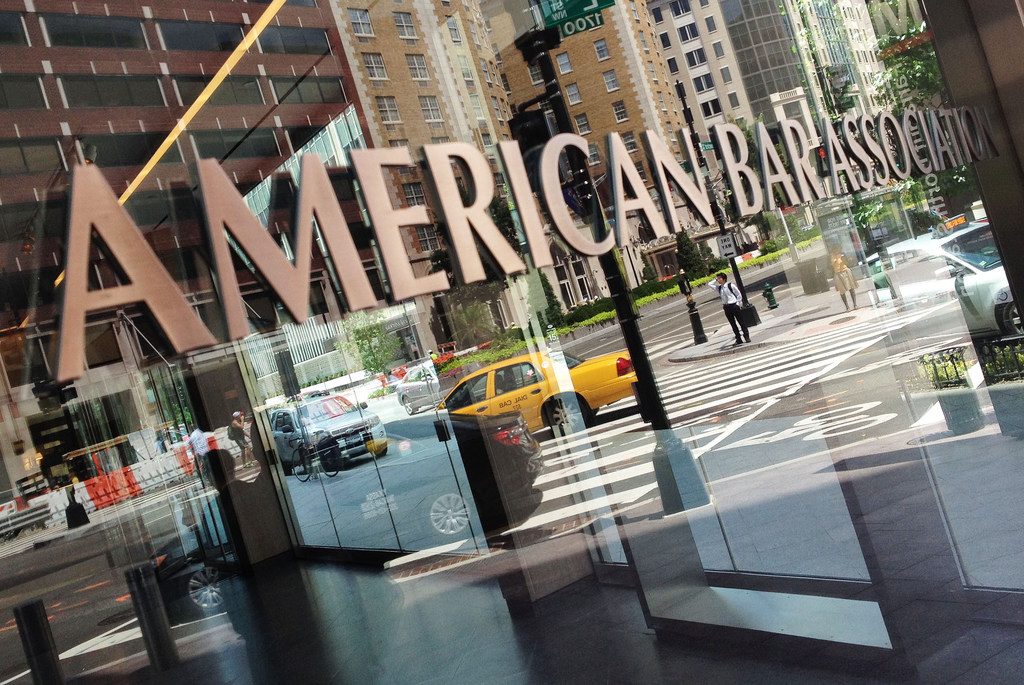ABA Hits Back Against Cooley Law School in Accreditation Suit
Cooley sued the ABA accrediting body after it posted a letter stating that the school was out of compliance with admissions rules.
January 09, 2018 at 02:14 PM
5 minute read
The American Bar Association is pulling no punches in its fight over Western Michigan University Cooley Law School's tenuous accreditation status.
The ABA's newly filed motion for summary judgment in a lawsuit brought by the Michigan-based law school highlights a series of problems at the school, from falling Law School Admission Test scores among the students it enrolls to plummeting bar pass rates among its graduates.
“The record amply demonstrates that Cooley has done just that, admitting many students who do not appear capable of graduating and being admitted to the bar, implicating the [ABA standards'] purpose to protect students from investing in an education that does not deliver,” reads the motion, filed Jan. 8.
Cooley filed the lawsuit in November after the ABA's accrediting body determined that it was out of compliance with rules pertaining to the admission of students and posted a letter detailing that decision on its website. (The school remains fully accredited for now.) Cooley sued, arguing that those identified shortcomings should not have been publicly disclosed because the ABA accrediting body, the Council of the Section of Legal Education, has not reached a final decision on the matter. Doing so violated common law due process, the school claimed. Disclosing the letter on its website prior to a final decision harms the school's reputation in the thick of the current admissions cycle, according to the law school.
Cooley lost the first round of litigation in December when Judge Arthur Tarnow of the U.S. District Court for the Eastern District of Michigan declined to issue a temporary restraining order preventing the ABA from posting the non-compliance letter. Tarnow reasoned that filing the lawsuit drew more attention to the school's shortcomings than the ABA action had.
Now, the ABA wants the suit dismissed. It argues that the council had “substantial evidence” that Cooley was violating its admission rules and its decision was neither arbitrary nor unreasonable. Moreover, the Higher Education Act requires the ABA to publish the Council's letter detailing its findings, the motion reads.
Cooley General Counsel James Robb said in an email Tuesday that the school will respond to the motion for summary judgment and that the ABA's admission standard is unlawfully vague. The ABA does not define which students “appear capable” of graduating and passing the bar, Robb said, and added that the school's most recent full accreditation review found it to be in compliance with the rule.
“This leaves the law school to guess what it must do to comply with [the admissions standard],” Robb said. “The ABA's approach is akin to ticketing the driver of a car for speeding when no speed limit is posted.”
Barry Currier, the ABA's managing director of accreditation and legal education, declined to comment Tuesday saying the organization does not weigh in on pending litigation.
The ABA's motion for summary judgment recounts some of the factors that prompted its conclusion that Cooley was out of compliance with rules meant to ensure that law schools admit students who are likely to succeed on campus and pass the bar exam. Among them:
- Cooley's first-time bar pass rate dropped from 76 percent to 48 percent over a seven-year period and hovered between 15 and 22 percent below the state average from 2012 to 2015.
- Many of the school's students with low LSAT scores and grade-point averages were not even sitting for the bar.
- The percentage of students coming to Cooley with LSAT scores of 143 or lower more than doubled over six years, accounting for more than half of the class.
The ABA has requested more data from the law school by Feb. 1. If that information does not establish that the school is in compliance with admissions rules, administrators must appear before the accreditation committee later this year and the school may be formally sanctioned. The ABA has stepped up its oversight of law schools in the past two years, partly in response to criticism from the U.S. Department of Education that it had been too lax. The ABA has taken action against 10 different schools since 2016, with North Carolina Central University School of Law this month becoming to latest to be put on notice that it is out of compliance with admissions rules.
The ABA's intense scrutiny comes at an inopportune time for Cooley. The school, which operates three campuses in Michigan and one in Florida, hopes to open a fifth location in Kalamazoo, Michigan, where Western Michigan University is located. Cooley is a private, for-profit school, but it affiliated with the public university in 2014 and changed its name from the Thomas M. Cooley Law School.
But the ABA has halted opening the new branch campus until it is satisfied that the law school is operating within its standards.
This content has been archived. It is available through our partners, LexisNexis® and Bloomberg Law.
To view this content, please continue to their sites.
Not a Lexis Subscriber?
Subscribe Now
Not a Bloomberg Law Subscriber?
Subscribe Now
NOT FOR REPRINT
© 2025 ALM Global, LLC, All Rights Reserved. Request academic re-use from www.copyright.com. All other uses, submit a request to [email protected]. For more information visit Asset & Logo Licensing.
You Might Like
View All
Penn State Dickinson Law Dean Named President-Elect of Association of American Law Schools

UChicago Law Professors Release Desk Reference Breaking Down Crypto, Web 3 for Attorneys
4 minute read

Trending Stories
- 1Courts Demonstrate Growing Willingness to Sanction Courtroom Misuse of AI
- 2The New Rules of AI: Part 1—Managing Risk
- 3Change Is Coming to the EEOC—But Not Overnight
- 4Med Mal Defense Win Stands as State Appeals Court Rejects Arguments Over Blocked Cross-Examination
- 5Rejecting 'Blind Adherence to Outdated Precedent,’ US Judge Goes His Own Way on Attorney Fees
Who Got The Work
J. Brugh Lower of Gibbons has entered an appearance for industrial equipment supplier Devco Corporation in a pending trademark infringement lawsuit. The suit, accusing the defendant of selling knock-off Graco products, was filed Dec. 18 in New Jersey District Court by Rivkin Radler on behalf of Graco Inc. and Graco Minnesota. The case, assigned to U.S. District Judge Zahid N. Quraishi, is 3:24-cv-11294, Graco Inc. et al v. Devco Corporation.
Who Got The Work
Rebecca Maller-Stein and Kent A. Yalowitz of Arnold & Porter Kaye Scholer have entered their appearances for Hanaco Venture Capital and its executives, Lior Prosor and David Frankel, in a pending securities lawsuit. The action, filed on Dec. 24 in New York Southern District Court by Zell, Aron & Co. on behalf of Goldeneye Advisors, accuses the defendants of negligently and fraudulently managing the plaintiff's $1 million investment. The case, assigned to U.S. District Judge Vernon S. Broderick, is 1:24-cv-09918, Goldeneye Advisors, LLC v. Hanaco Venture Capital, Ltd. et al.
Who Got The Work
Attorneys from A&O Shearman has stepped in as defense counsel for Toronto-Dominion Bank and other defendants in a pending securities class action. The suit, filed Dec. 11 in New York Southern District Court by Bleichmar Fonti & Auld, accuses the defendants of concealing the bank's 'pervasive' deficiencies in regards to its compliance with the Bank Secrecy Act and the quality of its anti-money laundering controls. The case, assigned to U.S. District Judge Arun Subramanian, is 1:24-cv-09445, Gonzalez v. The Toronto-Dominion Bank et al.
Who Got The Work
Crown Castle International, a Pennsylvania company providing shared communications infrastructure, has turned to Luke D. Wolf of Gordon Rees Scully Mansukhani to fend off a pending breach-of-contract lawsuit. The court action, filed Nov. 25 in Michigan Eastern District Court by Hooper Hathaway PC on behalf of The Town Residences LLC, accuses Crown Castle of failing to transfer approximately $30,000 in utility payments from T-Mobile in breach of a roof-top lease and assignment agreement. The case, assigned to U.S. District Judge Susan K. Declercq, is 2:24-cv-13131, The Town Residences LLC v. T-Mobile US, Inc. et al.
Who Got The Work
Wilfred P. Coronato and Daniel M. Schwartz of McCarter & English have stepped in as defense counsel to Electrolux Home Products Inc. in a pending product liability lawsuit. The court action, filed Nov. 26 in New York Eastern District Court by Poulos Lopiccolo PC and Nagel Rice LLP on behalf of David Stern, alleges that the defendant's refrigerators’ drawers and shelving repeatedly break and fall apart within months after purchase. The case, assigned to U.S. District Judge Joan M. Azrack, is 2:24-cv-08204, Stern v. Electrolux Home Products, Inc.
Featured Firms
Law Offices of Gary Martin Hays & Associates, P.C.
(470) 294-1674
Law Offices of Mark E. Salomone
(857) 444-6468
Smith & Hassler
(713) 739-1250









